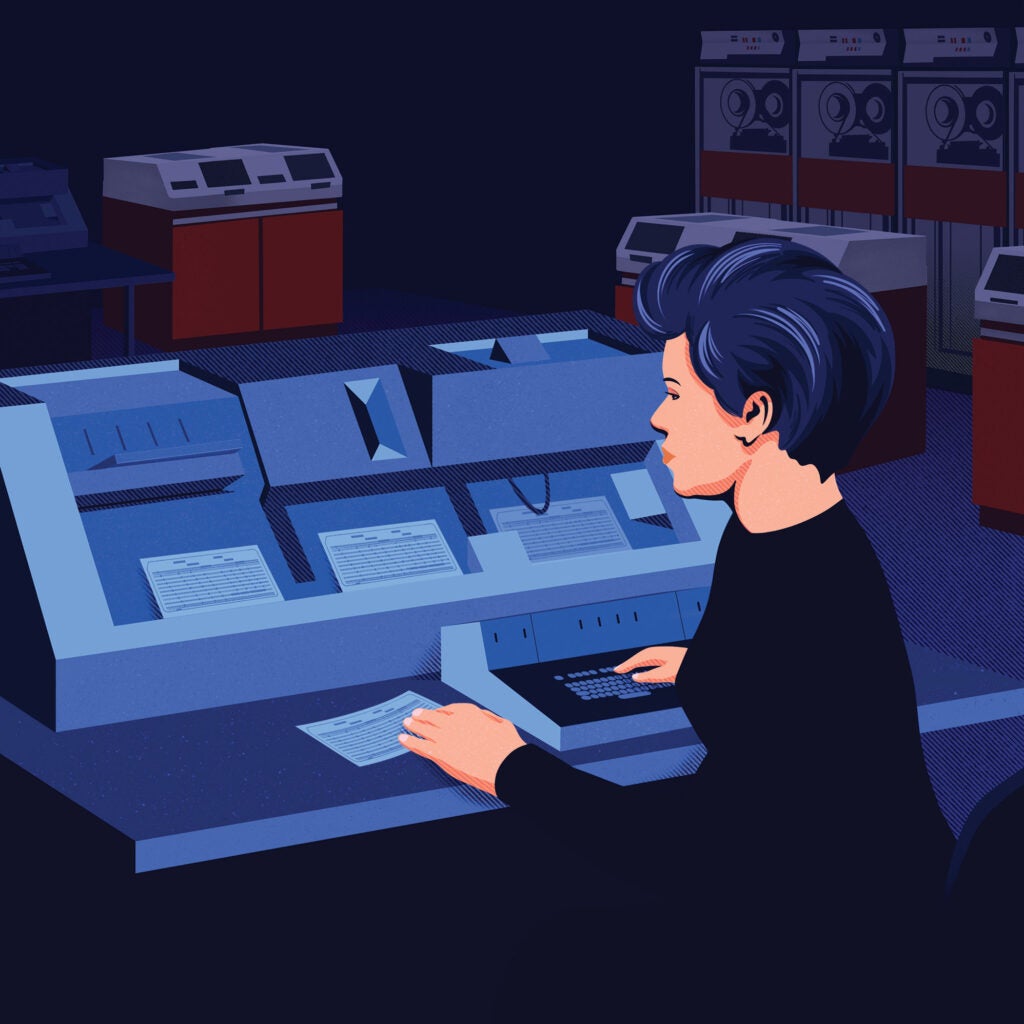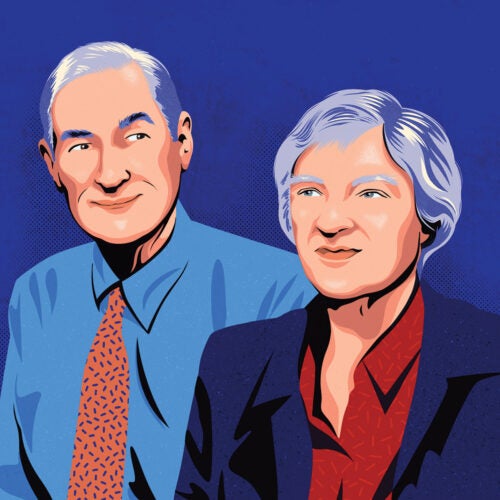
Barbara (Block) Duprey ’66 was recruited from URI by IBM. Her first project there? The Apollo space program. She helped land the first man on the moon and then helped her husband, Phil Duprey ’66, land a job as a programmer, too. More than half a century later, they are still together.
Phil Duprey and Barbara Block met on their first day of classes at URI in 1962—in Professor Nancy Potter’s honors English class—dated throughout college, and married in 1966, a week after graduation. The next three years were a wild ride.
Barbara was recruited straight out of college by IBM, and her first project as a computer programmer was on Apollo, including Apollo 11, the mission that landed the first man on the moon.
“As the first project of your professional life, you couldn’t beat it,” she says. “I was stationed at Goddard Space Flight Center in Maryland, where we created the backup system for Apollo.”
That backup system was crucial to the safety of the three astronauts, who would soon careen through 238,000 miles of outer space to land on a hunk of rock that, since the dawn of humanity, had been considered unreachable. Barbara was part of the team that wrote code for an entirely separate computer system that could take over the mission instantly if there were any glitches in Houston.
These were the early days of computer science, and Barbara worked on the “brand-spanking-new” IBM 360, a mainframe computer the size of a refrigerator—and part of a system that filled an entire room. She was able to do this largely because of rare course offerings at URI.
“URI was way ahead of its time in terms of computer science,” says Barbara, who majored in mathematics. “The reason IBM came to URI to recruit programmers was that the University offered three courses in computer programming while most other universities offered none.”
Her training wasn’t the only thing that made Barbara a rarity. As a female math major who gravitated toward computers, she was even more of an anomaly.
So, when she arrived at IBM, she was among a minority of women working on the Apollo project.
Phil chimes in, addressing Barbara, “You were a unicorn.” He is clearly still impressed by his wife’s achievements.
A World Away
While Barbara was writing code in Maryland, Phil was on the other side of the world serving as an Army intelligence officer in the jungles of Vietnam.
He had helped put himself through college by joining ROTC and after graduating with a degree in English, landed a position with the National Security Agency.
“Because I already worked for NSA, when I was activated, I was assigned to Army intelligence rather than becoming a combat platoon leader. I was fortunate,” he says, adding somberly, “because many of my classmates never came home.”
Although he wasn’t in combat, he was far from safe. In one of his letters home to Barbara, he included a piece of shrapnel he pulled out of his desk.
“There were rocket attacks all the time, and we piled sandbags along the sides of our tents to the height of a sleeping man,” says Phil.
Adds Barbara: “When we were on R&R in Hawaii, Phil dove under the hotel bed when a siren went off.”

A Bold Transition
When Phil was finally discharged, it was time to find a career. Barbara urged him to apply for a job at IBM, which he thought was absurd, given that he had no computer training and hadn’t majored in math like she had.
“I told him that writing code isn’t really about math, it’s about logic,” says Barbara. “Back then, there were three disciplines that correlated well with success as a programmer—math, music, and languages. All involved pattern recognition and required attention to detail.”
Phil agreed to give it a try. He aced IBM’s computer aptitude tests and enrolled in the company’s programmer training. The rest, as they say, is history. Barbara and Phil enjoyed long and productive careers with IBM.
“That’s when my English background was really useful,” says Phil. “Programmers usually can’t write or give presentations very well. I developed a role for myself helping to write proposals for multibillion-dollar government contracts. The ability to write was crucial to my later career.”
The end came suddenly in 1994 when Phil and Barbara were 49 years old. They had worked for IBM for a quarter-century, but when the air traffic control team they worked with was sold to the Loral Corp., that company soon laid off more than 2,000 workers.
“Phil and I got ‘surplussed’ on the same day,” says Barbara. “We packed our belongings with guards standing by to make sure we didn’t steal anything; then the guards escorted us out of the building.”
Fortunately, they had both been buying IBM stock through the years and had other resources, so they were not in grave financial danger. The couple used the opportunity to move to Austin, Texas, where Barbara worked for a few more years as a programmer and Phil launched a new phase of his life. He served three terms on the City Council and currently works with the Chamber of Commerce and volunteers for the local library foundation, as well as other local charities. They both worked with the local theater, and Phil has become involved in commercial real estate.
Both Phil and Barbara credit their career success and flexibility to the training they received during their undergraduate years, but while they both consider themselves successful, Phil sees his wife as much more.
“Barbara was a trailblazer,” says Phil, “and URI was part of the reason.”
—Bill Ibelle
Illustrations: Jordi Ferrándiz
